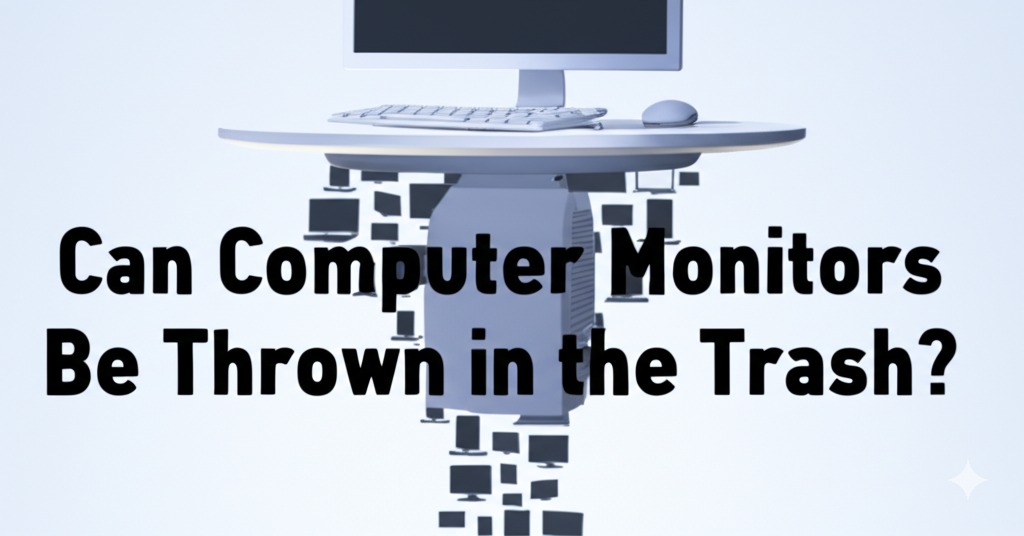When it’s time to upgrade your workspace or replace a malfunctioning screen, you might find yourself wondering: Can computer monitors be thrown in the trash? The short answer is no, but there’s more to the story.
Disposing of electronics improperly can lead to environmental hazards and, in some areas, even legal consequences. In this article, we’ll explore why computer monitors shouldn’t go in the trash, what your eco-friendly disposal options are, and how to safely get rid of old monitors without harming the planet—or breaking the law.
Why You Shouldn’t Throw Computer Monitors in the Trash
1. Environmental Hazards
Computer monitors—especially older models like CRT (cathode ray tube) displays—contain harmful substances such as:
- Lead
- Mercury
- Cadmium
- Arsenic
These toxic materials can seep into soil and groundwater when left in landfills, posing serious environmental and health risks.
2. Legal Restrictions
Many states and countries have strict e-waste laws that prohibit disposing of electronics with regular household waste. Violating these regulations can result in fines or penalties.
Here are a few regions with strong e-waste rules:
- California (Electronic Waste Recycling Act)
- New York State
- European Union (WEEE Directive)
What Counts as a Computer Monitor?
Before you toss out a screen, know what qualifies as a monitor. The term typically includes:
- LCD monitors
- LED monitors
- CRT monitors
- All-in-one computer displays
- Portable monitors
If the device connects to a computer and displays visual output, it falls under the e-waste category and should be handled accordingly.
How to Properly Dispose of a Computer Monitor
1. E-Waste Recycling Centers
One of the best options is to take your monitor to a certified e-waste recycling center. These facilities specialize in:
- Safe removal of hazardous components
- Recycling of metals and plastics
- Data destruction (if applicable)
Use sites like Earth911.com or contact your local waste management office to find a center near you.
2. Retailer Take-Back Programs
Many electronics retailers offer recycling or trade-in programs. Some well-known options include:
- Best Buy
- Staples
- Office Depot
These stores often accept old monitors and may even offer store credit or discounts in return.
3. Manufacturer Recycling Programs
Check with your monitor’s manufacturer. Brands like Dell, HP, Apple, and Samsung have mail-back or drop-off recycling initiatives to encourage responsible disposal.
4. Community Collection Events
Many cities hold periodic electronics recycling drives where residents can drop off e-waste for free. These events are great opportunities to get rid of multiple electronics in one go.
Can You Donate or Reuse an Old Monitor?
Absolutely! If your monitor still works, consider these options:
1. Donation
Charities, schools, and nonprofit organizations may welcome gently used monitors. Try:
- Local shelters
- Community centers
- Tech access nonprofits like Computers with Causes
2. Repurposing
Turn that old monitor into something new:
- A second screen for productivity
- A digital photo frame
- A home security display
Get creative—you might extend the life of your device in an unexpected way.
What Happens If You Throw It Away Anyway?
You might be tempted to sneak it into your curbside bin. Here’s what could happen:
- Environmental contamination from leaking toxins
- Fines if caught violating local disposal laws
- Missed recycling opportunities for valuable materials
Avoiding the trash isn’t just a suggestion—it’s a responsibility.
Conclusion: Choose Smart Disposal Over the Trash
To recap: Can computer monitors be thrown in the trash? No—they shouldn’t. Whether it’s to protect the environment, follow the law, or support sustainability, disposing of monitors properly is the smart choice.
Here’s what you can do instead:
- Use a certified recycling center
- Participate in retail or manufacturer take-back programs
- Donate or repurpose your old monitor
By making eco-conscious decisions, you help reduce electronic waste and make a positive impact on the planet.

Caleb Carlson is a contributing writer at Computer Site Engineering, specializing in computer technology, software trends, and hardware innovations. His articles simplify complex tech topics, making them accessible to readers of all levels.





